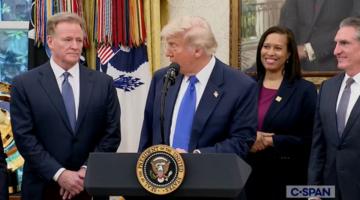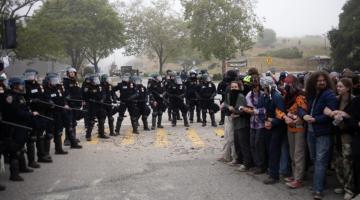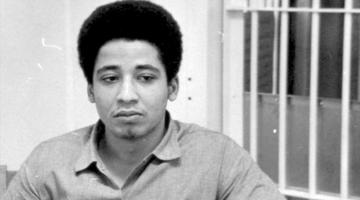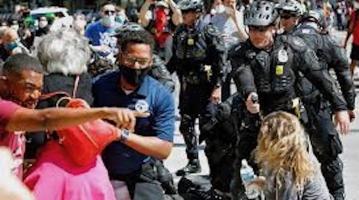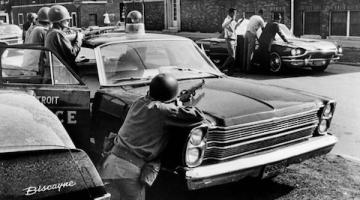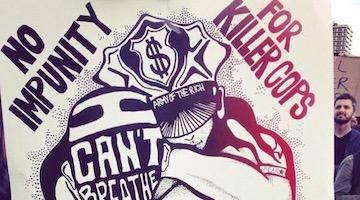Community control of the police offers a concrete vision for what the beginnings of police abolition might look like.
“Now is the time to leverage the U.S.’ imperial decline to petition nations around the world for support in the struggle against racism at home.”
A mass movement in the streets has changed many things in just a matter of weeks. Local and state governments have voiced tepid support for cutting police budgets, television networks have canceled programs valorizing cops, and corporate media outlets have faced pressure to condemn or outright replace editorial staff. Yet nothing encapsulates the contradictions of this current period more than tens of thousands of people marching in the streets against racist police violence and the police simultaneously continuing to murder Black Americans in cold blood. In the late evening of June 12th, Rayshard Brooks was gunned down after being awakened by Atlanta police in a Wendy’s drive through. Brooks is said to have “resisted arrest” but video of the event clearly shows that the police had no business arresting him let alone making intoxication a capital crime. The murder of Rayshard Brooks is another stark indication that ruling class patronage to the movement does not change the fundamental character of the U.S. state and only strengthens the argument for the full abolition of the police as we know it.
Abolition is hardly a new concept. In the U.S. context, abolition was first and foremost an African-led project to eradicate the violent system of chattel slavery that helped birth the United States of America. Just as the mass rebellions in the streets following George Floyd’s murder have sent the entirety of society scrambling for the “correct” response to racist policing, so too did massive rebellions against slavery amongst Africans in the U.S. mainland and the Caribbean place the system of bondage in crisis less than two centuries ago. The successful abolition of chattel slavery led directly to the erection of Jim Crow terrorism as the primary way for the ruling class to protect the capitalist and racist foundations of society. A new abolitionist movement in the 21st century will need to develop consciousness of the roots of the U.S. social order and place politics in command of its modes of resistance.
“Ruling class patronage to the movement does not change the fundamental character of the U.S. state.”
Abolition of the police is a revolutionary project that cannot be fulfilled by the U.S. imperial state as it is currently constituted.As Max Rameau and Netfa Freeman so correctly analyzed, the ruling class will placate the movement with marginal reforms while reorganizing the national security state to protect its wealth. Their conclusion is validated by the last two centuries of the United States’ sordid history. Slave patrols were repurposed as official police departments to enforce Black Codes and Jim Crow lynch law. In the U.S.’ industrial centers, police departments replaced private mercenaries as the principle force of strike-breaking and anti-labor repression. According to scholar Gary Potter, nearly one million workers were hauled to prison between the years 1875 and 1900 for violating “public order” laws designed to secure labor’s obedience to capital.
Thus, the abolition of the police is a revolutionary demand since only revolutionary conditions can support it. Abolishing law enforcement requires the complete overthrow of the mode of economic and political rule in the United States. In a period characterized by intersecting crises, it should come as no surprise that the abolition of the police is receiving both major pushback at the level of the state. Donald Trump, Joe Biden, and the rest of official Washington has committed to providing police departments with more tools to do their jobs more effectively. Activists such as Mariame Kaba have articulated abolition as a massive reduction in the police apparatus and the redirection of those funds toward healthcare, housing, and the basic needs of the people.
“The ruling class will placate the movement with marginal reforms while reorganizing the national security state to protect its wealth.”
That the abolition of police is a discussion taking place across all strata of the U.S. population is a major step forward for the people. However, the movement to abolish the police must place politics in command if it is to build and strengthen in the days, months, and years to come. Politics is about power: who has it and who does not. The questions of power are still very much up for debate within the movement: who will have power to determine the character of policing in Black and other oppressed communities, and what will this power look like? The movement has gained significant traction in building popular support for the demand to at least defund the police as a first step toward abolition. Next on the agenda is to begin a wide-ranging discussion on the relationships of power that ultimately determine whether such a demand is met on the terms of the oppressed or on the terms of the oppressor.
On the domestic front, community control of the police offers a concrete vision for what the beginnings of police abolition might look like. Community control would place police departments under the auspices of an elected review board that has the power to hire and fire its police officers and investigate and punish their crimes. The demand for community control of the police is not a new one. The Black Panther Party made community control of the police a central pillar of its organizational activity. In 1971, the Black Panther party successfully organized for the community control of the police to be placed on the ballot in Berkley, California and lost the vote by mere percentage points. Community control of the police was one of the Black Panther Party’s many demands for the redistribution of power from the grips of white supremacist and capitalist government authorities back to Black communities themselves.
“Politics is about power: who has it and who does not.”
Today, the struggle for community control of the police is being led by organizations such as the National Alliance Against Racist and Political Repression, the Black is Back Coalition, and Pan-African Community Action. It is important that these organizations are supported and sustained as they comprise of some of the few in existence which provide a concrete vision toward abolition. The term “abolition” has been thrown around in recent years, often in relation to the demand for an end to the reign of terror waged by Immigration and Customs Enforcement (ICE) agents on undocumented communities. Academics and “latte left” pundits have attempted to place the demand firmly within an anarchistic political camp that calls for the elimination of an oppressive institution without any clear vision for its replacement. This leaves the very notion of “abolition” vulnerable to the predations of the ruling class, which has every interest in delegitimizing abolition and using its myriad of repressive tools to disorganize the movement.
Placing politics in command of the abolition movement is not merely a domestic project. The system of U.S. capitalism and white supremacy is currently in its most crisis-ridden phase of imperialist development. Any demand for self-determination inside of the United States is inextricably linked to the global struggle against imperialism. The United States is the world’s most dangerous and racist police-state. Many trillions of dollars over the last two decades alone have gone to funding death squads, drone strikes, black sites, and military occupations to overthrow, destabilize, and dominate nations of people on every continent in the name of American hegemony. U.S. militarism, like police violence in the United States, is justified by the callous dehumanization of its targets whether in Afro-Colombia, Syria, or China.
“Any demand for self-determination inside of the United States is inextricably linked to the global struggle against imperialism.”
The movement against racist policing has made inroads toward involving the UN Human Rights Council in the investigation of police murders of Black Americans, with six hundred NGOS and the families of Black Americans killed by police leading the effort. African nations have asked the UN Human Rights Council to immediately begin debates about racism and police brutality. While these mark positive steps toward applying international pressure on the United States to address racist policing, more must be done to leverage power in the international arena. The history of the Black liberation movement is full of examples of Black activists demanding that the UN enforce the right of Black people to self-determination. In the mid-20th century, Black radicals on numerous occasions called for the United Nations to protect Black Americans, with such efforts leading to the We Charge Genocide petition. Malcolm X demanded that the UN provide a plebiscite where Black Americans could vote on whether they wanted to form their own nation apart from the United States, a demand that was supported by the Black Panther Party.
While historical efforts for UN-backed protection may not have materialized, they did force the U.S. state to grant concessions to the movement. From 1917 (the year of the Russian Revolution) to the 1970s, the U.S. ruling class worried that its white supremacist system would push Black Americans to look to socialism as an antidote to white imperialist rule. Black-led social movements were often characterized as communist plots and the U.S. state worked hard to suppress its racist Jim Crow policies abroad to the point where the State Department organized a Jazz-led public relations campaign on the African continent. So-called “civil rights” were the product of domestic pressure placed on the state by Black Americans and their allies as well as the specter of Black alignment with global socialism if the movement’s demands were rejected wholesale.
“The U.S. ruling class worried that its white supremacist system would push Black Americans to look to socialism.”
The current iteration of Black-led struggle in the streets of cities across the United States faces a much different terrain globally. U.S. imperialism is in steep decline. The United States’ monopolistic and financialized capitalist economy is seeing its share of the global economy shrink by the decade. Politically, U.S. elites have waged a nearly four year-long campaign of delegitimization of their own system by claiming that Russia interfered in the electoral process and brought Donald Trump to the White House. China is on the rise and the world is looking toward its fast-developing market socialist economy for solutions to the problems of underdevelopment, climate change, and international governance. The United States has responded to both its decline and China’s rise by waging endless war on the planet to slow the process.
Now is the time to leverage the U.S.’ imperial decline to petition nations around the world for support in the struggle against racism at home. China, Russia, Iran, Syria, Venezuela, Cuba, and dozens of other nations have a vested interest in curbing the threat of the militarist U.S. regime. The relationship, of course, must be reciprocal in character. Oppressed peoples and workers in the U.S. mainland should make clear their interest in aiding the right of oppressed nations to self-determination and peaceful development in exchange for concrete support for the struggle against racist policing on the UN stage. The corporate media has already vilified China and Iran’s coverage of the movement against racist policing as a cynical attempt to “exploit divisions” in the so-called exceptional United States. Such slander is nothing but an attempt to avoid global accountability for American-made racism and political repression.
Solidarity coupled with the demand for community control of the police holds the potential for revolutionary possibilities to emerge in the belly of the beast. However, as Amilcar Cabral noted, we must “tell no lies, claim no easy victories.” None of us have a crystal ball. What we have is history and politics as our guide in the navigation of the here and now. Both are powerful weapons in the struggle for liberation. We should not hesitate to use them.
Danny Haiphong is an activist and journalist in the New York City area. He and Roberto Sirvent are co-authors of the book entitled American Exceptionalism and American Innocence: A People’s History of Fake News--From the Revolutionary War to the War on Terror (Skyhorse Publishing). He can be reached at wakeupriseup1990@gmail.com, on Twitter @spiritofho, and on Youtube at The Left Lens with Danny Haiphong.
COMMENTS?
Please join the conversation on Black Agenda Report's Facebook page at http://facebook.com/blackagendareport
Or, you can comment by emailing us at comments@blackagendareport.com


